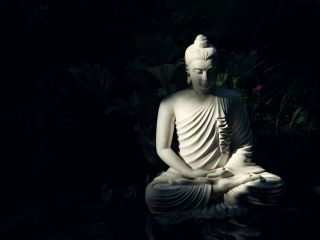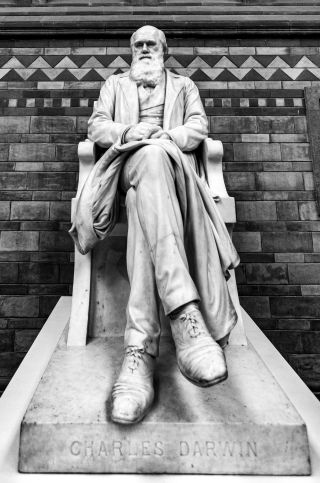Self-Control
Buddha, Darwin, and Dumbledore: How to Override Our Impulses
Reflecting on common wisdom can help us to make healthier choices.
Updated February 15, 2024 Reviewed by Lybi Ma
Key points
- Harvesting the Buddha’s teachings may not necessarily require a dedicated meditation practice.
- Many of our evolved behavioral tendencies don't fit well with how we live today.
- We must all face the choice between what is right and what is easy. —Albus Dumbledore.

Our health behaviors profoundly influence how we feel and significantly affect the length and quality of our lives.
Researchers and health professionals devote their lives to unravelling the mysteries behind the considerable variation in human health behaviors. What motivates some people to prioritize a healthy diet and physical activity, while others do not? What factors lead some to engage in the excesses of drugs, alcohol, and risky sexual behaviors, while others steer clear of such vices?
The answers to these questions are complex and subject to extensive debate. A diverse body of scientific literature explores the numerous social determinants of health behaviors, coupled with an evolving comprehension of genetic markers of addiction. Philosophical arguments challenging the notion of free will even cast doubt on our capacity to make non-determined choices concerning our health and well-being.
Add to this an ever-expanding marketplace inundated with apparent health choices related to what we eat, drink, inhale, and how we spend our time. There is also an exploding informational landscape instructing how we should navigate these choices, accompanied by a proliferation of self-help tools, resources, and influencers eager to cash in on our "health journeys."
Motivation to look after our health can be drawn from a variety of conventional and unconventional voices. However, beyond the facts, fads, and influencers, drawing inspiration from the ‘sages through the ages’ can revitalise our efforts in the pursuit of health and happiness.
Unhealthy Impulses
We all experience unhealthy impulses: a craving for unhealthy food, a desire to binge-watch TV, an urge to smoke or vape, or the temptation to linger in bed rather than go for a morning run. We are often painfully aware of what we should do, and we even recognize that this would most likely make us feel better both now and in the future. Despite this, we frequently experience a compelling urge to act contrary to our health, and unfortunately, we often succumb to these unhealthy impulses.
Why do we experience unhealthy impulses?
We encounter urges that are detrimental to our health due to a combination of psychological factors, the consequences of our evolutionary heritage, and the social and cultural stimuli we experience.
Given the propensity for urges that are detrimental to our health to emerge, we may ask how we are expected to override unhealthy impulses. Seeking insights from common wisdom can provide valuable guidance.

Harvesting the Buddha's Teachings
The Buddha’s teachings encourage us to sit and experience the seemingly endless bubbling of thoughts, impulses, urges, and sensations that pass from moment to moment. The goal of this practice is to recognize that these thoughts and sensations are not "you," and to eradicate the clinging and attachment we feel towards fleeting mental and sensory processes.
Researchers and health professionals are beginning to advocate for the health benefits of mindfulness. However, harvesting the Buddha’s teachings for the betterment of our health may not necessarily require a dedicated meditation practice. Simply recognising that the unhealthy impulses we experience are transient, and not intrinsic to who we are, can significantly reduce the power they wield over us.
This leads us to our next question: If these impulses are not part of me, then what are they, and why do they arise?
Darwin and How We Live Today
Charles Darwin’s proposition that species evolve over time through the process of natural selection paved the way for understanding human behaviors through an evolutionary lens.

For example, the evolutionary mismatch hypothesis claims that many of our evolved behavioral tendencies don't fit well with how we live today. This is because the environments in which our behavioral and psychological mechanisms evolved were vastly different from the modern world we now inhabit.
In the past, our ancestors faced periods of scarcity where high-calorie foods were limited. As a result, humans developed a preference for energy-dense foods like sugars and fats, helping them to survive in challenging environments. However, in today's world, where calorie-dense foods are abundant, this evolutionary adaptation can cause us to overeat, leading to obesity and related diseases.
Similarly, in ancestral environments, conserving energy by staying in a secure and sheltered space was essential for survival. This adaptation allowed our ancestors to conserve energy when resources were scarce. However, in the modern era, where necessary resources are less scarce and sedentary lifestyles are common, the impulse to stay in bed can contribute to a lack of physical activity and a range of health problems.
The Wisdom of Dumbledore
The Buddha can help us realise that our urge to overeat is temporary, and Darwin will teach us to reflect on the advantages this impulse would have offered our ancestors. These insights can help us to understand our experiences of unhealthy impulses, and to shift our thoughts and behaviors towards healthier choices.
However, there are times when we reduce these insights to intellectual pondering, and the impulse to dismiss them at an experiential level becomes too formidable to override with quiet reflections.
In these moments, we might draw inspiration from the wise old wizard Albus Dumbledore.
In Harry Potter and the Goblet of Fire, Dumbledore reminds Harry, “We must all face the choice between what is right and what is easy.” Dumbledore encourages Harry to always follow the right path and to draw strength from those closest to him. Though easily dismissed as simple words from a children’s book, our ability to make the right choice is often experienced as having the strength not to choose what is easy.
Part of the genius of Rowling’s books is how she portrays the heroism of Harry. Heroes like Superman and Wonder Woman experience little fear and fragility, and for that, we marvel at their strength. In contrast, Harry’s courage is demonstrated precisely because of his almost crippling fear and fragility, and his ability to overcome it.
Furthermore, Harry is continuously confronted by the allure of evil, and the tempting ease with which his powers could be used for selfish ends. Yet, despite the conflicting urges, impulses, and temptations that Harry experiences, he finds the strength to make the right choice, at least most of the time.
Finding the strength to override our unhealthy impulses may boil down to a simple question of motivation: Why should I live a healthy life? The answer to this may be different for each of us, but for many will include the desire to have the energy to make the most of the time we have with those closest to us, and to serve as an example for others to do the same.





